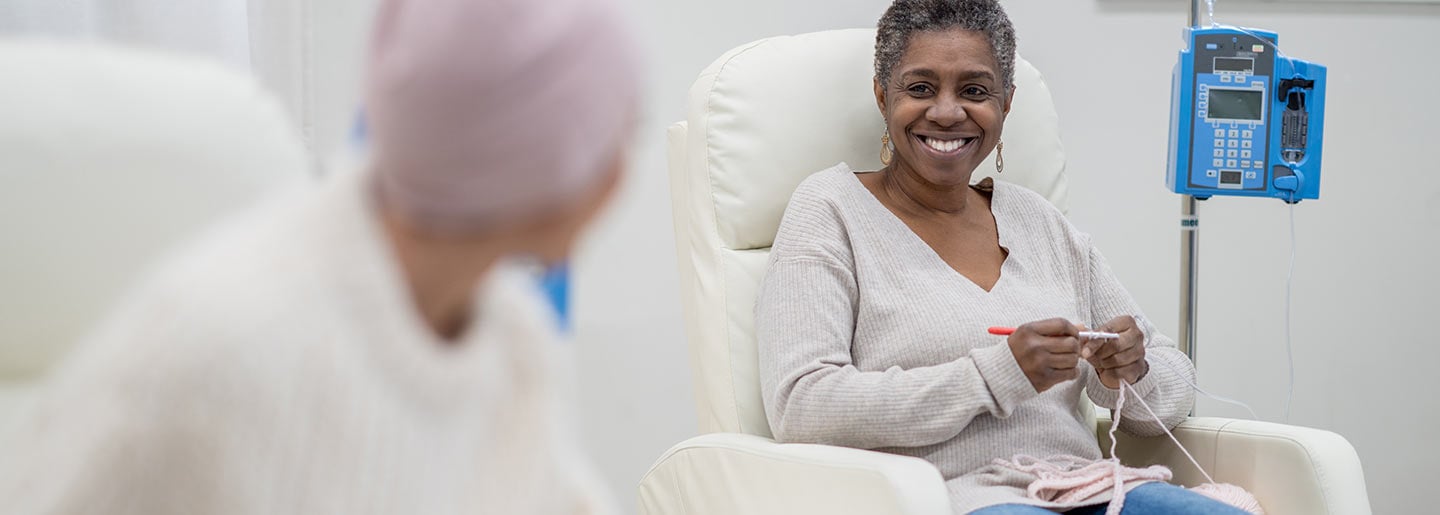
Chemotherapy for Lung Cancer
Chemotherapy is commonly used to treat lung cancer, either on its own or in combination with other treatments. Chemo medications work by targeting and destroying rapidly dividing cells. Because cancer cells tend to divide more quickly than most healthy cells, chemotherapy can be an effective treatment for many types of cancer. Additionally, unlike surgery and radiation therapy, which are localized treatments, chemotherapy is a systemic treatment. As such, powerful chemo medications can circulate throughout the body and potentially reach cancer cells that have spread beyond the lungs.
If your lung cancer treatment plan includes chemotherapy, you may find it helpful to learn what you might expect both during your treatment and afterward. Knowledge is powerful—in addition to easing some of your anxiety, it can help you feel more confident about the important journey that lies ahead. Of course, each person’s experience with chemotherapy is different, so your best source of information is always your physician, who is familiar with your unique circumstances and can provide you with individualized advice.
How does chemotherapy work against lung cancer?
Depending on the goals of treatment, chemotherapy may be administered on its own or combined with other approaches like radiation therapy or surgery. This systemic treatment delivers powerful, cancer-fighting drugs into the bloodstream that travel to the lungs and throughout the body to reach cancer cells that have spread (metastasized). Chemotherapy can be used to shrink a tumor prior to surgical removal, or following surgery to help destroy any cancer cells that remain.
You might receive chemotherapy medication intravenously or by swallowing a pill, and your oncologist will determine how many rounds (or “cycles”) of chemotherapy you’ll receive as well as the appropriate dosage. Each cycle is typically three or four weeks long and includes a rest period to recover from the side effects.
What should I expect during chemotherapy for lung cancer?
Intravenous chemotherapy is received in one of our infusion centers. Each session takes a few hours. Immediately beforehand, your physician will perform a physical exam to determine the appropriate medication dosage and ensure you are healthy enough to receive treatment. You will then rest comfortably while the medications drip into your vein. Afterward, the IV catheter will be removed and your physician will check your vital signs. You should drink plenty of fluids to help flush the chemo through your body, and carefully dispose of your waste to avoid exposing others to the medications. Your physician will provide guidelines on what you can eat and drink before each chemo session and also explain the possible side effects.
When talking with your physician, be sure to ask about your treatment schedule so you can plan to take some time off from work or school, arrange for transportation to and from each chemo session and request help with child care and errands. Also, learn more about what will be available to you in our infusion centers so you’ll know what you need to bring to stay as comfortable as possible. Remember to pack some activities to help you pass the time while you are receiving chemotherapy.
What are the side effects of chemotherapy for lung cancer?
Chemotherapy attacks cancer cells, but it also impacts some healthy cells in the hair follicles, blood, mouth and digestive system. There are multiple types of chemotherapy drugs and dosages that are used to treat small cell and non-small cell lung cancers, so your side effects will vary according to the details of your treatment plan. However, generally speaking, the most common side effects of lung cancer chemotherapy include:
- Hair loss
- Nausea and vomiting
- Reduced appetite and weight loss
- Mouth sores
- Constipation or diarrhea
- Fatigue
- Increased risk of infection
- Easy bleeding or bruising
Advancements in cancer treatment have made some chemotherapy drugs easier to tolerate than others in the past, but you should still expect to experience a few side effects. Your physician can prescribe medication to reduce chemotherapy side effects such as nausea and provide resources to help you cope with the physical and emotional changes lung cancer treatment can bring. Self-care measures like implementing a nutrient-rich diet, journaling and performing light exercise can also be helpful as you navigate treatment.
Why choose Moffitt Cancer Center for chemotherapy for lung cancer?
At Moffitt Cancer Center, our medical oncologists work hand in hand with a patient’s surgeons, radiation oncologists and supportive care providers to create a detailed, individualized plan encompassing all aspects of lung cancer treatment. We have a team of medical oncologists who specialize exclusively in providing chemotherapy for lung cancer patients. As a result, they not only have extensive experience in selecting the most appropriate medications and dosing regimens, but they are also highly skilled in helping patients manage their side effects and improve their quality of life during lung cancer treatment.
No referral is required to schedule an appointment with a member of our lung cancer oncology team. Contact us at 1-888-663-3488 or complete our new patient registration form online to get started.
References
Chemotherapy | American Lung Association.
Non-small Cell Lung Cancer Chemotherapy | Chemo Side Effects
